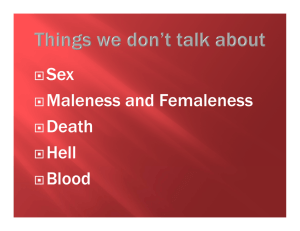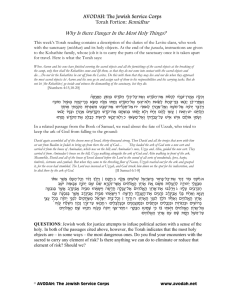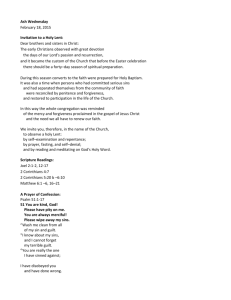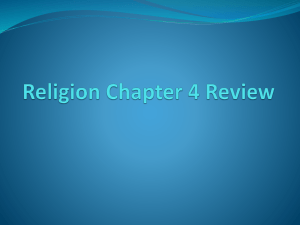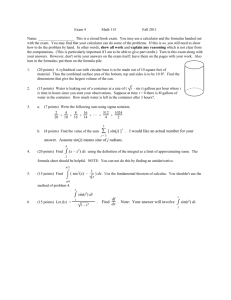031 Holy Justice
advertisement
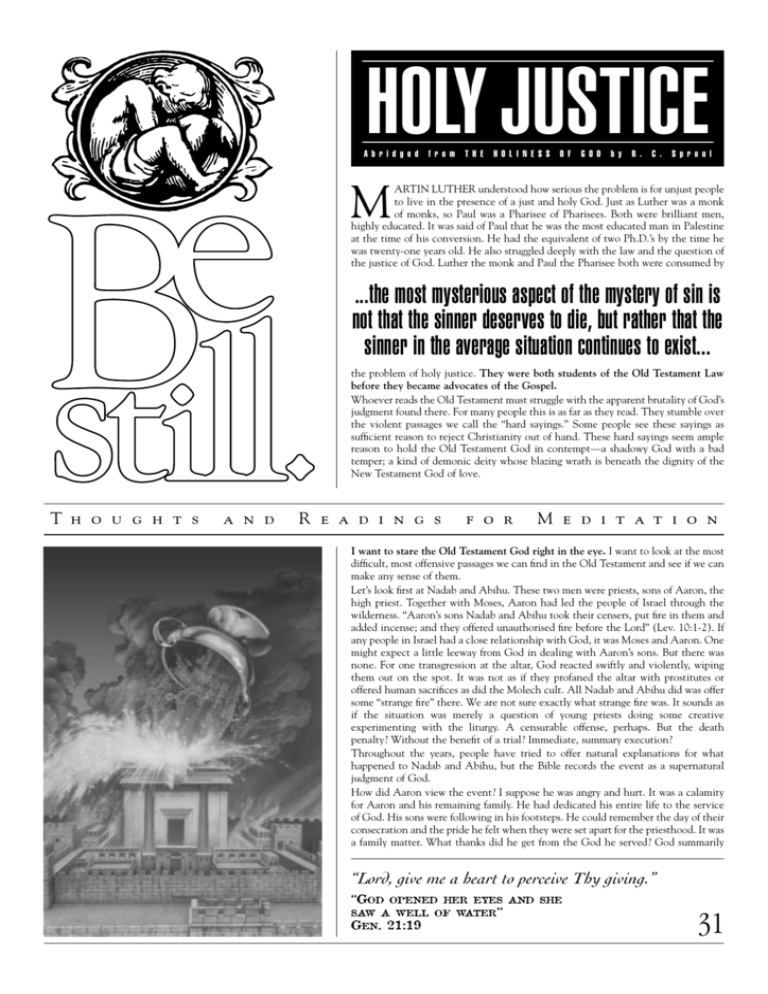
HOLY JUSTICE Abridged from THE HOLINESS OF GOD by R. C. Sproul M ARTIN LUTHER understood how serious the problem is for unjust people to live in the presence of a just and holy God. Just as Luther was a monk of monks, so Paul was a Pharisee of Pharisees. Both were brilliant men, highly educated. It was said of Paul that he was the most educated man in Palestine at the time of his conversion. He had the equivalent of two Ph.D.’s by the time he was twenty-one years old. He also struggled deeply with the law and the question of the justice of God. Luther the monk and Paul the Pharisee both were consumed by ...the most mysterious aspect of the mystery of sin is not that the sinner deserves to die, but rather that the sinner in the average situation continues to exist... the problem of holy justice. They were both students of the Old Testament Law before they became advocates of the Gospel. Whoever reads the Old Testament must struggle with the apparent brutality of God’s judgment found there. For many people this is as far as they read. They stumble over the violent passages we call the “hard sayings.” Some people see these sayings as sufficient reason to reject Christianity out of hand. These hard sayings seem ample reason to hold the Old Testament God in contempt—a shadowy God with a bad temper; a kind of demonic deity whose blazing wrath is beneath the dignity of the New Testament God of love. T h o u g h t s a n d R e a d i n g s f o r M e d i t a t i o n I want to stare the Old Testament God right in the eye. I want to look at the most difficult, most offensive passages we can find in the Old Testament and see if we can make any sense of them. Let’s look first at Nadab and Abihu. These two men were priests, sons of Aaron, the high priest. Together with Moses, Aaron had led the people of Israel through the wilderness. “Aaron’s sons Nadab and Abihu took their censers, put fire in them and added incense; and they offered unauthorised fire before the Lord” (Lev. 10:1-2). If any people in Israel had a close relationship with God, it was Moses and Aaron. One might expect a little leeway from God in dealing with Aaron’s sons. But there was none. For one transgression at the altar, God reacted swiftly and violently, wiping them out on the spot. It was not as if they profaned the altar with prostitutes or offered human sacrifices as did the Molech cult. All Nadab and Abihu did was offer some “strange fire” there. We are not sure exactly what strange fire was. It sounds as if the situation was merely a question of young priests doing some creative experimenting with the liturgy. A censurable offense, perhaps. But the death penalty? Without the benefit of a trial? Immediate, summary execution? Throughout the years, people have tried to offer natural explanations for what happened to Nadab and Abihu, but the Bible records the event as a supernatural judgment of God. How did Aaron view the event? I suppose he was angry and hurt. It was a calamity for Aaron and his remaining family. He had dedicated his entire life to the service of God. His sons were following in his footsteps. He could remember the day of their consecration and the pride he felt when they were set apart for the priesthood. It was a family matter. What thanks did he get from the God he served? God summarily “Lord, give me a heart to perceive Thy giving.” “GOD OPENED HER EYES AND SHE SAW A WELL OF WATER” GEN. 21:19 31 executed his sons for what appeared to be a minor infraction of the rules of the altar. Aaron rushed to see Moses and tell him about it. It was as if Aaron were saying: “Okay, God, I’m going to tell on you. I’m going straight to Moses. You’re going to have to deal with us both on this one.” So Aaron went to Moses and pled his case: “Moses then said to Aaron, ‘This is what the Lord spoke of when he said: “Among those who approach me I will show myself holy; in the sight of all the people I will be honoured”’” (Lev. 10:3). Moses gave Aaron the answer of the Lord. He reminded him of the original consecration of the priests. They had been set apart for a sacred task and solemnly charged with the precise requirements of their office. They had the privilege of ministering before a holy God. Each vessel in the tabernacle was made to precise specifications, and each item was sanctified by elaborate measures commanded by God. There was no ambiguity to be found in these commands. With respect to the altar of incense, Aaron and his sons were specifically instructed in the proper procedures: “Do not offer on this altar any other incense or any other burnt offering or grain offering, and do not pour a drink offering on it. Once a year Aaron shall make atonement on its horns. This annual atonement must be made with the blood of the atoning sin offering for the generations to come. It is most holy to the Lord.” (Exod. 30:9-10). The instructions had been clear. Theirs was an act of blatant rebellion, an inexcusable profaning of the Holy Place. They committed a sin of arrogance, an act of treason against God, and God’s judgment was swift. His explanation to Moses was clear: “I will show myself holy; in the sight of all the people I will be honoured.” The capstone of this episode is found in Leviticus 10:3: “Aaron remained silent.” What else could he do? The debate was over. The evidence was in and God had rendered his verdict. Like sinners at the Last Judgment, his mouth was stopped. He could think of no excuse to offer, no protest to make. Here is an example of God’s punitive justice. Is this punishment cruel and unusual? Does it go beyond the limits of justice and cross the border into injustice? Built into our concept of justice is the idea that the punishment must fit the crime. The Bible makes it clear that Nadab and Abihu could not plead ignorance, but they never dreamed their sin was so serious that it would prompt God to execute them on the spot. Such measure of punishment not only puzzles us, it staggers us. How do we square this narrative with what Genesis teaches earlier about the character of God’s justice? Genesis asserts that the judge of all the earth will do right (Gen. 18:25). The basic assumption of Israel is that God’s judgments are always according to righteousness, never unfair, never whimsical or tyrannical. It is impossible for God to be unjust, because His justice is holy. We meet even greater difficulty with the story of Uzzah. When David ascended to the kingship of Israel, he moved quickly to consolidate his kingdom. He conferred with his officers and military commanders and decided to bring the ark of the covenant, Israel’s most sacred vessel, out of “retirement” and back to a central place. The ark had been captured by the Philistines, and it was said that in that fateful day the glory had departed from Israel. Israel’s greatest treasure was stolen and carried off to the temple of Dagon. When the ark was returned, it was placed in safekeeping awaiting the appropriate time for its public restoration to a position of prominence in the midst of the nation. Finally the hour came—David wanted the glory back. He said: “‘Let us bring the ark of our God back to us, for we did not inquire of it during the reign of Saul.’ The whole assembly agreed to do this, because it seemed right to all the people” (1 Chron. 13:3-4). The ark was the rallying point for the nation. It was the throne of God, the sacred seat of the Most High. It had been constructed and ornamented by the strict design of God Himself. It was to be housed in the sanctus sanctorum, the Holy of Holies. The ark was a chest made of acacia wood, overlaid with gold on the inside and outside. It had a gold molding around it. Four rings were fastened to its feet so that poles could be inserted through the rings to carry the chest. The poles were also made of acacia wood and overlaid with gold. The lid of the chest was called an “atonement cover.” It was also made of pure gold. Two cherubim made of hammered gold were mounted on each end of the chest, facing each other with their wings spread upward. This was the sacred object that David ordered returned to Jerusalem. They moved the ark of God from Abinadab’s house on a new cart, with Uzzah and Ahio guiding it. David and all the Israelites were celebrating with all their might before God, with songs and with harps, lyres, tambourines, cymbals and trumpets. When they cam to the threshing floor of Kidon, Uzzah reached out his hand to steady the ark, because the oxen stumbled. The Lord’s anger burned against Uzzah, and he struck him down because he had put his hand on the ark. So he died there before God. Then David was angry because the Lord’s wrath had broken out against Uzzah. (1 Chron. 13:7-11) If God made David angry with this violent outburst of wrath, how much more unsettled does it make a reader who is unskilled in theology? David was a man after God’s own heart. Not only was he a masterful king, an accomplished musician, and a champion warrior, but he was also a premier theologian. Even more than the case of Nadab and Abihu, the execution of Uzzah stirs protests from readers who have been taught that God is a God of love and kindness. The Bible says of God that He is longsuffering and slow to anger. It sure didn’t take his anger long to reach the boiling point with Uzzah. Uzzah touched the ark, and wham! God exploded in fury. Surely Uzzah’s reaction was instinctive. He did what any pious Jew would do to keep the ark from falling into the mud. He reached out his hand to steady the ark, to protect the holy object from falling. It was not a premeditated act of defiance toward God. It was a reflex action. From our vantage point it seems like an act of heroism. We think Uzzah should have heard the voice of God shouting down from heaven, crying, “Thank you, Uzzah!” God didn’t do that. Instead, he killed Uzzah. He slaughtered him on the spot. Another summary execution. But what was Uzzah’s sin? To be a priest in Israel, one had to be from the tribe of Levi. All priests were Levites, but not all Levites were priests. A special family branch of the Levites were the clan of Kohathites, consecrated by God to a highly specialised task—taking care of the sacred articles of the tabernacle: “This is the work of the Kohathites in the Tent of Meeting: the care of the most holy things” (Num. 4:4). It is important to remember that the tabernacle was a tent. It was portable. When the tribes of Israel moved, they carried the tabernacle with them so that God would be in their midst. When the tabernacle was transported, it was necessary first to cover and shield the holy vessels. We read, “After Aaron and his sons have finished covering the holy furnishings and all the holy articles, and when the camp is ready to move, the Kohathites are to come to do the carrying. But they must not touch the holy things or they will die. The Kohathites are to carry those things that are in the Tent of Meeting” (Num. 4:15). To reinforce this command, God adds further provisions and regulations: The Lord said to Moses and Aaron, “See that the Kohathite tribal clans are not cut off from the Levites. So that they may live and not die when they come near the most holy things, do this for them: Aaron and his sons are to go into the sanctuary and assign to each man his work and what he is to carry. But the Kohathites must not go in to look at the holy things, even for a moment, or they will die.” (Num. 4:17-20) Uzzah was probably a Kohathite. He knew exactly what his duties were and had been trained thoroughly in the discipline of his calling. He understood that God had declared that the touching of the ark of the covenant was a capital offense. No emergency was grounds for breaking that inviolate command. The elaborate construction of the ark, complete with golden rings through which long poles were inserted, was so fashioned as to make it clear that the ark itself was not to be touched. The men commissioned to transport the ark could touch only the poles and the rings. Then it was the task of the Kohathites to carry the ark by these long poles. No provision was made for hurrying the procedure by transporting the ark via an oxcart. We must ask the question, What was the ark doing on an oxcart in the first place? Not only was Uzzah forbidden to touch the ark, he was forbidden even to look at it. He touched it anyway. He stretched out his hand and placed it squarely on the ark, steadying it in place lest it fall to the ground. An act of holy heroism? No! It was an act of arrogance, a sin of presumption. Uzzah assumed that his hand was less polluted than the earth. But it wasn’t the ground or the mud that would desecrate the ark; it was the touch of a man. God did not want His holy throne touched by that which was contaminated by evil, that which was in rebellion to Him, that which by its ungodly revolt had brought the whole creation to ruin and caused the ground and the sky and the waters of the sea to groan together in travail, waiting for the day of redemption. Man. It was man’s touch that was forbidden. Uzzah was not an innocent man. He was not punished without a warning. There was no caprice in this act of divine judgment. There was nothing arbitrary about what God did in that moment—but there was something unusual about it. The execution’s suddenness and finality take us by surprise and at once shock and offend us. We find the stories of Nadab and Abihu, and the account of Uzzah difficult to stomach because we do not understand what it means to be holy, or what sin is, or what grace is. The story of Uzzah is an example of divine justice, not of divine mercy. But we cannot begin to understand divine mercy until we first have some understanding of divine justice. God’s justice is according to his divine righteousness, or the moral excellence of His character. God always plays by the rules. And what God does is always consistent with who God is. He is utterly incapable of one single unholy act. There is a consistency in God, a “straightness” about Him, and this is seen in His outward behaviour. In all eternity God has never done a crooked thing. He killed Nadab and Abihu, he killed Uzzah. He did the same thing to Ananias and Sapphira in the New Testament. These were righteous acts of judgment. The Bible clearly teaches that God is the Supreme Judge of the universe. The question we ask after reading about Uzzah is this: Is God qualified for the job? The patriarch Abraham wrestled with the justice of God. God announced that He was going to annihilate the cities of Sodom and Gomorrah, and Abraham was concerned that the innocent would perish along with the guilty. He feared that the judgment would be indiscriminate, like a teacher punishing a whole class for the misbehaviour of one student. “Far be it from you to do such a thing—to kill the righteous with the wicked ... Will not the Judge of the earth do right?” (Gen 18: 24-25) A more rhetorical question has never been asked. Abraham had no idea how far such an act would be from God. There was never a remote possibility that God would kill innocent people along with the guilty. For God to do that, He would have to cease being holy. He would have to stop being God. God was willing to bend over backwards for Abraham. All he had to do was find ten righteous people, and God would spare the whole city. The implication of the text is that God would have spared it for one person if Abraham could find one. And what happened to Sodom and Gomorrah? “Early the next morning Abraham got up and returned to the place where he had stood before the Lord. He looked down toward Sodom and Gomorrah, toward all the land of the plain, and he saw dense smoke rising from the land, like smoke from a furnace” (Gen. 19: 27-28). The Judge of heaven and earth did right. No innocent people were punished. God’s justice is never divorced from His righteousness. He never condemns the innocent. He never clears the guilty. He never punishes with undue severity. He never fails to reward righteousness. His justice is perfect justice. However, God does not always act with justice. Sometimes He acts with mercy. Mercy is not justice, but it is not injustice—it does not violate righteousness. What about the obvious difference between the tone of the New Testament and the ‘harsh’ tone of the Old Testament. We cannot deny that the New Testament seems to reduce the number of capital offenses. What we fail to remember, however, is that the Old Testament list itself represents a massive reduction in capital crimes from the original list—a bending over backwards of divine patience and forbearance. The Old Testament Law is one of astonishing grace! How so? “The soul who sins is the one who will die” (Ezek. 18:4). In creation, all sin is deemed worthy of death. Every sin is a capital offence: sin brings the loss of the gift of life. God is not obliged to give us that gift. He is not in debt to us. And the right to any human existence is forfeited by people when they sin. The task given to mankind in creation was to be God’s image bearer, to mirror and reflect His holiness. God put Adam and Eve on probation and said “If you sin you will die.” Was the penalty stated like this: “If you sin, then some day you will die”? No! The penalty was not only death, but instant death. Death that very day: death as swiftly as it fell on Nadab and Abihu, death as suddenly as that of Uzzah, as quickly as it befell Ananias and Sapphira. Numerous commentators have tried to soften the divine warning by interpreting it as a kind of spiritual death. To be sure, Adam and Eve did suffer spiritual death that very day, but God delayed the full measure of justice in His mercy so that grace would have time to work. Yet the death penalty was imposed and is still imposed. All people die. We are all sitting on death row awaiting execution. Do you think the death penalty for sin is unjust? Be careful. If you do, you assail the righteous judge of the earth, slander the character of God and have never come to grips with what sin actually is. Life on this planet has become the arena in which we daily carry out the work of cosmic treason. Sin is the supreme act of ingratitude toward the One to whom we owe everything. Have you ever considered the deeper implications of the slightest sin, of the most minute peccadillo? What are we saying to our Creator when we disobey Him at the slightest point? “Go d, Your law is not goo d. My judgment is better than Yours. Your authority does not apply to me. I am above Your jurisdiction.” It is the ultimate conspiracy. We plot for the throne and reach for the crown, saying in effect to God, “We will not have you to rule over us!” And when we sin as the image bearers of God, we are saying to the whole creation, “God is covetous, God is ruthless, God is bitter, God is a murderer, a thief, a slanderer, an adulterer.” When we sin, we not only commit treason against God, we do violence to each other. Sin violates people. There is nothing abstract about it. By my sin I hurt human beings, injure their persons, despoil their goods, impair their reputation, rob from them a precious quality of life, crush their dreams and aspirations for happiness. When I dishonour God, I dishonour all people who bear His image. Is it any wonder, then, that God takes sin so seriously? Hans Küng, the controversial Roman Catholic theologian, writing about the seemingly harsh judgments of sin God makes in the Old Testament, says that the most mysterious aspect of the mystery of sin is not that the sinner deserves to die, but rather that the sinner in the average situation continues to exist. Küng asks the right question. The issue is not why God punishes sin but why does he permit the ongoing human rebellion? What human king would display so much patience? Indeed, He is so slow to anger that when His anger does erupt, we are shocked and offended by it. We forget rather quickly that God’s patience is designed to lead us to repentance, to give us time to be redeemed. We use His grace as an opportunity to become more bold in our sin. We delude ourselves into thinking that either God doesn’t care about it or that He is powerless to punish us. The supreme folly is that we think we will get away with our revolt! The Old Testament is actually the record of a God who is patient in the extreme with a persistently stiff-necked people who rebel time after time against God. However, we must still face the difficult question of the conquest of Canaan. There God explicitly commanded the slaughter of men, women and children. The Promised Land was given to Israel by a bloody sword, and God directly issued the order for the bloodbath in Deuteronomy 7:1-2. How could He have commanded such a horrific thing? Interpretations which seek to soften the Biblical record overlook some vital aspects of the matter. First, there is a historical precedent that is far more severe than the conquest of Canaan—the Flood. God destroyed the entire population of the world excepting Noah and his family. More important is the failure to understand the nature of sin. Of the multitudes of women and children in Canaan, none was innocent. The conquest was an explicit expression of God’s righteous judgment on a wicked nation. He made that point clear to Israel. He also made it clear to the people of Israel that they also were not innocent. To the Canaanites God poured out justice, to the Jews God poured out mercy. In Deuteronomy 9:4-6, God reminds Israel three times that God was not on their side because they were better than pagan nations. “Understand, then, that it is not because of your righteousness that the Lord your God is giving you this good land to possess...” The holiness of God is at the issue of the conquest of Canaan. He punished the insult to His holiness daily perpetrated by the Canaanites, and He was preparing a land and a nation for a holy purpose. Salvation for the nations was to come out of Israel. The Promised Land was to be the breeding ground for the coming Messiah. God did not choose Israel because Israel was already holy. He chose them to make them holy. There was no room for pagan shrines and pagan rites. God commanded Israel that no mercy be shown towards the inhabitants of the land and He explained why, warned them of the consequences of disobedience (Deut 7:3-6), and ordained a scorched-earth policy to purge the land for the sake of future salvation. God’s justice was neither whimsical nor unwarranted. We must add that there is no real conflict between the God of the Old Testament and the God of the New. It was the Old Testament God whom Christ called “Father.” It was the God of Abraham, Isaac and Jacob who so loved the world that He sent His one and only Son to redeem it. It was Jesus’ meat and drink to do the will of this God. It was zeal for the God who slew Nadab, Abihu and Uzzah that consumed Christ. It was the God who flooded the world who pours the waters of His grace out to us. The false conflict between the two testaments may be seen in the most brutal act of divine vengeance ever recorded in Scripture. It is not found in the Old Testament but in the New Testament. The most violent expression of God’s wrath and justice is seen in the Cross. If ever a person had room to complain of injustice, it was Jesus. He was the only innocent man ever to be punished by God. If we stagger at the wrath of God, let us stagger at the Cross. If we have cause for outrage, let it be directed at Golgotha. The Cross was at once the most horrible and the most beautiful example of God’s wrath. It was the most just and the most gracious act in history. God would have been more than unjust, He would have been diabolical to punish Jesus if Jesus had not first willingly taken on Himself the sins of the world. Once Christ had volunteered to be the Lamb of God, loaded with our sin, He became the most grotesque and v i l e t h i n g o n t h i s p l a n e t . Wi t h t h a t concentrated load of sin He carried, He became utterly repugnant to the Father. God poured out His wrath on this obscene thing, made Christ accursed for the sin He bore. Here was God’s holy justice perfectly demonstrated. Yet it was done for us. He took what justice demanded from us. This “for us” aspect of the Cross is what displays the majesty of its grace. At the same time justice and grace, wrath and mercy. It is too astonishing to fathom. We cringe at Go d’s justice because its expression is so unusual. As Küng observed, God’s usual course of action is one of grace. Grace no longer amazes us. We take it for granted. Perhaps the best illustration of this may be found in one of the most difficult of the “hard sayings” of Jesus (Luke 13:1-5). The question is raised, What about the people Pilate slaughtered, or the innocent people killed by the falling of the tower in Siloam? How could God allow these things to happen? The question is actually a thinly veiled accusation. How can God allow innocent people to suffer? Note Jesus’ response. He did not say, “These things happen and there is not much we can do about it,” or “I know I taught you that the One who keeps Israel neither slumbers nor sleeps, but that was a poetic statement, a bit of hyperbole.” No. Jesus rebuked the people for putting their amazement in the wrong place. He said,“Unless you repent, you too will all perish.” In effect He was saying: “You people are asking the wrong question. You should be asking me, ‘Why didn’t that tower fall on my head?’” Only once in two decades of teaching theology has a student come to me and say “Why did God redeem me?” We are not really surprised that God has redeemed us. Somewhere deep inside, we harbour the notion that God owes us His mercy. What amazes us is justice, not grace. Our tendency to take grace for granted was powerfully demonstrated while I was teaching an Old Testament course to 250 college students. I explained that the first of three term papers was due on my desk by noon the last day of September, no extensions. If the paper was not turned in on time, the student would receive an F for the assignment. The students acknowledged that they understood the requirements. On the last day of September, twenty-five students stood, quaking in terror, full of excuses and pleading for an extension. I bowed to their pleas for mercy. “All right,” I said. “I’ll give you a break this time. But remember, the next assignment is due the last day of October.” On the last day of October, fifty students came empty-handed. They were nervous but not in panic. When I asked for their papers, again they were contrite. Once more I relented. “Okay, but this is the last time. If you are late for the next paper, it will be an F. No excuses, no whining. Is that clear?’ I was Mr. Popularity. Can you guess what happened on the last day of November? Right. One hundred and fifty students came with their terms papers. The other hundred strolled into the lecture hall utterly unconcerned. “Don’t worry, Prof. We’re working on our term papers. We’ll have them for you in a couple of days.” I began marking Fs in my lethal black grade book. The students reacted with unmitigated fury! “That’s not fair!” they howled. “If you insist on justice,” I replied, “I’ll not only give you an F for this assignment, but I’ll change your last grade to the F you so richly deserved.” They had no more arguments to make, apologised for being so hasty and were suddenly happy to settle for one F instead of two. The normal activity of God involves far more mercy than I showed those students. Old Testament history covered hundreds of years. In that time God was repeatedly merciful. When His divine judgment fell on Nadab or Uzzah, the response was shock and outrage. We have come to expect God to be merciful. From there the next step is easy: We demand it. We soon forget that with our first sin we forfeited all rights to the gift of life. That I am drawing breath is an act of divine mercy. God owes me nothing. I owe Him everything. If He allows a tower to fall on my head, I cannot claim injustice. One thing is certain: No matter how much injustice I have suffered at the hands of other people, I have never suffered the slightest injustice from the hand of God. We often blame God for the injustices done to us and harbour the bitter feeling that He has not been fair to us. Even if we recognise that God is gracious, we think that He has not been gracious enough. We think we deserve more grace! Read that last sentence again. What is wrong with it? It is impossible for anyone, anywhere, anytime to deserve grace. As soon as we talk about deserving something, we are no longer talking about grace, but about justice. God never “owes” grace. “I will have mercy on whom I will have mercy.” (Exod. 33:19). This is the divine prerogative. God is never obliged to treat all people equally. We must not take His grace for granted. We must never lose our capacity to be amazed by grace. It is the confusion between justice and mercy that makes us shrink in horror when we read the stories of Nadab, Abihu, and Uzzah. When God’s justice falls, we are offended because we think God owes perpetual mercy. God’s grace is not infinite. God is infinite, and God is gracious, but God sets limits to His patience and forbearance. He warns us over and over again that someday the axe will fall and His judgment will be poured out. Since it is our tendency to take grace for granted, my guess is that God found it necessary from time to time to remind Israel that grace must never be assumed. On rare but dramatic occasions He showed the dreadful power of His justice. It is as if He were saying, “Be careful. While you enjoy the benefits of my grace, don’t forget my justice. Don’t forget the gravity of sin. Remember that I am holy.” “No heart can conceive that treasury of mercies which lies in “It is a throne of grace that God in Christ is represented to us this one privilege, in having liberty and ability to approach unto upon; but yet it is a throne still whereon majesty and glory do God at all times, according to his mind and will.” reside, and God is always to be considered by us as on a throne.” — JOHN OWEN — Edited by Michael Bull (02) 4782 4695 PO Box 331 Katoomba NSW 2780 Australia Be Still is available in PDF from www.bullartistry.com.au

